Keeping animals out of your garden is a common problem for garden lovers. Deer, squirrels, and even your pets can mess up your yard, so finding solutions to keep them out is important.
We’ll share 13 easy ways to protect your garden, from using garlic and pepper to installing motion-activated devices and electric fences. You’ll also learn how herbs can keep animals away and how simple items like soap and catnip can help.
Did you know wind chimes can help, too? We’ll discuss how these noise-makers and other simple ideas can keep your vegetable patches and flower beds peaceful and animal-free.
Ready to learn more about animal-proofing your home’s garden? Let’s begin.
What Animals Should You Watch Out for in Your Garden?
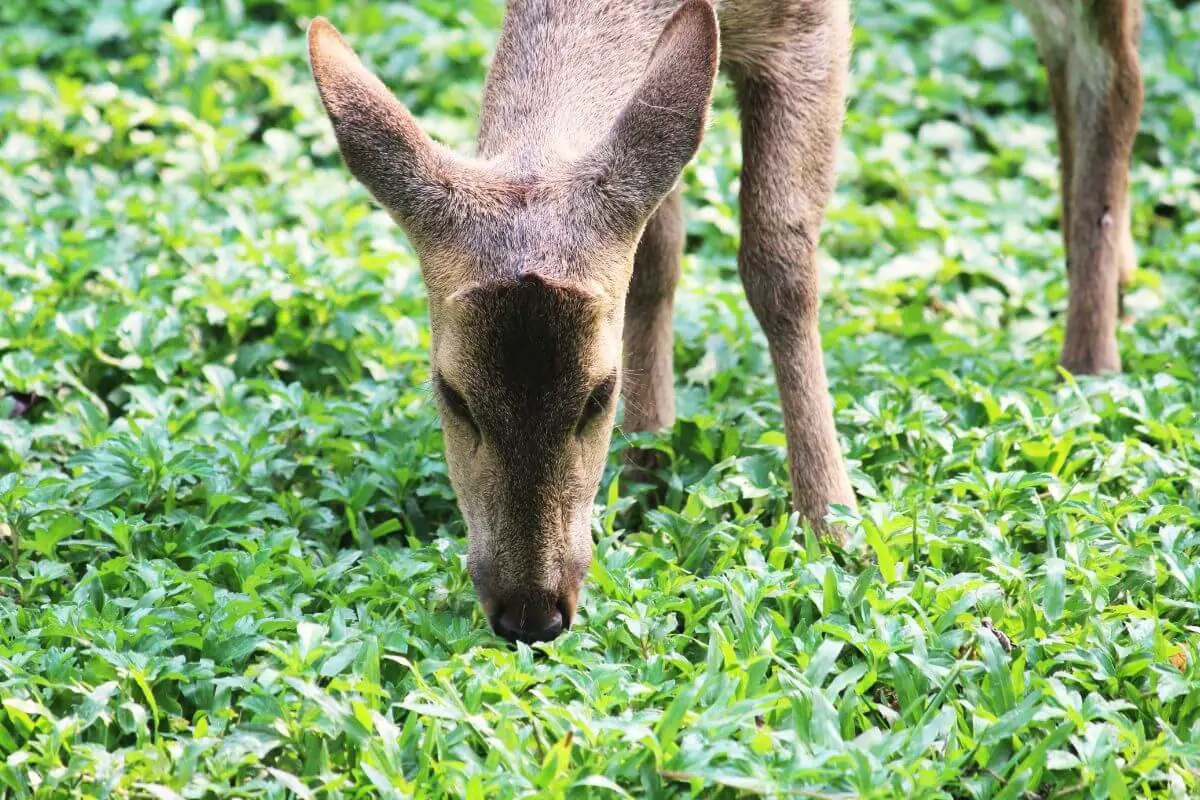
Many animals, including deer, rabbits, and groundhogs, can damage your garden. You can identify them by the tracks they leave in your yard.
Here are some of the common animals that can harm your garden:
- Cats – Cats may use garden beds as litter boxes. Their digging can also disrupt plant roots and soil structure, potentially damaging your plants.
- Dogs – Some dogs have a strong prey drive and may chase and kill small wildlife in the yard, damaging your garden in the process.
- Raccoons – Raccoons often raid vegetable gardens and fruit patches, feeding on corn, berries, and various fruits.
- Squirrels – Squirrels can cause damage by digging holes, uprooting plants, and chewing on different parts of the plants.
- Deer – Deer leave hoof prints and nibble on plants, often causing significant damage.
- Rabbits – Rabbits leave tiny tracks and snip off plants at ground level.
- Groundhogs – Groundhogs dig holes and leave pellets, disrupting the soil and plant roots.
- Birds – Birds will peck at crops, causing damage to fruits and vegetables.
- Chickens – Chickens or ducks may eat vegetables and fruits, scratching up the soil and plants as they forage.
It’s important to remember that wild animals can also threaten your garden if you live near wildlife. Opossums, skunks, foxes, coyotes, and snakes all love to eat seeds and plant roots. Rats love vegetables too, so it’s important to learn how to keep rats away from vegetable gardens.
Understanding which animals are causing damage helps you protect your garden more effectively. You can take the right measures to keep your garden safe and thriving by identifying the troublemakers.
What Are the Best Ways to Keep Animals Out of Your Garden?
You’ve worked hard on your garden, so it’s important to protect it from animals that might ruin your efforts. Here are some easy ways to control the spread of pests and keep animals out of your garden.
1. Use Natural Repellents
You can animal-proof your garden naturally by using items like citronella oil spray, garlic, cayenne pepper, and other things you might already have at home. Making a spray from these ingredients can also help keep insects away.
Here’s a simple way to make an insect-repellent spray for your garden:
1. Gather the Ingredients – You will need citronella oil, garlic, and a few other items.
2. Mix the Ingredients With Water – Put everything in a blender with some water and blend until smooth.
3. Strain the Mixture – Remove any solid bits so you only have the liquid left.
4. Adjust the Thickness of Your Mixture – Add more water if the mixture is too thick.
Use your homemade spray on your garden every week. You can spray it around your outdoor space if you prefer, instead of on the plants directly.
You can also try using hot sauce as a repellent for a different approach:
1. Mix Hot Sauce With Water – Put hot sauce and water in a spray bottle.
2. Shake the Mixture Well – Make sure the mixture is well-mixed.
3. Spray the Mixture on Your Vegetables – Use the spray on your vegetables to keep animals from eating them.
You can also keep animals away from your favorite plants by planting things that they like more. This tactic not only diverts pests but also adds diversity to your garden, which can improve soil health and attract beneficial insects.
2. Use Artificial Repellants
Keeping animals away from your garden is a common challenge for many of us. In addition to natural repellents, here are some artificial methods to help protect your garden from unwanted visitors:
- Commercial Repellents and Insecticides – Repellants and insecticides from brands like Raid, Off!, and D-Con can be effective. They work by either killing bugs or creating a barrier that pests don’t like. Always follow the instructions carefully to keep your garden safe.
- Rubber Snakes and Plastic Forks – Some people have had success with using rubber snakes and plastic forks to scare off animals. However, these methods might not work for everyone or every type of pest.
- Cages – Cages around garden beds can stop animals from reaching your plants. This method is particularly effective for protecting young seedlings and vulnerable crops from birds and small mammals.
While strong chemicals can sometimes negatively affect people, wildlife, and beneficial insects, they can still be an effective solution for your garden when used correctly. It’s important to choose the right products and always read the labels carefully to ensure safe and effective use.
Remember, every garden is different. You might need to try a few methods to see what works best for you.
3. Set Up Fencing and Chicken Wire
Protecting your plants from animals is important for maintaining a healthy garden. One effective method is to use fencing, which acts as a barrier to keep out unwanted visitors like deer, rabbits, and groundhogs.
Setting up a sturdy fence is a great way to defend your garden. You can build a wooden fence yourself or with assistance — it’s a solid choice for keeping out larger animals.
It’s essential to select the appropriate fencing type. Here are some suggestions:
- Use welded wire or hardware cloth for small animals like rabbits.
- Consider a plastic fence that’s 7.5 feet tall, with wire mesh at the bottom, to keep deer away.
- Placing chicken wire at the fence’s base can prevent animals from digging underneath.
Securing chicken wire with stakes or weights is effective against smaller animals. Along with choosing the correct fence type, this approach provides a robust defense against wildlife intruding into your garden.
4. Install Electric Fencing
Electric fencing is an effective way to keep animals out of gardens. Electric fencing works by shocking the animal with electricity. This causes the animal to jump back.
Here’s how to set up electric fences for specific animals that might enter your garden:
| Animal | Number of Wires | Wire Spacing and Placement |
|---|---|---|
| Raccoons and Opossums | 1 wire | 4 to 6 inches above ground |
| Rabbits | 3 to 5 wires | 4 inches apart, first wire at 4 inches |
| Groundhogs/Woodchucks | 1 wire | 4 inches above ground |
| Squirrels | 3 to 5 wires | 4 inches apart, first wire at 4 inches; clear overhanging limbs |
| Deer | 7 to 9 wires | 10 inches apart, top wire at least 70 inches above ground |
| Feral Hogs | 5 or 6 wires | 6 inches apart, the first wire at 6 inches |
These are more expensive and need maintenance but they can be used year-round. Different types are available depending on the animal you want to keep out.
5. Install Motion-Activated Frightening Devices
These motion-activated frightening devices scare away animals when they detect motion. Some of these devices release sounds, while others send vibrations through the air.
Here are some effective motion-activated devices for keeping animals out of your garden:
- Motion-Activated Sprinklers – Motion-activated sprinklers have a sensor that detects animal movement and sprays water to scare them away. This is safe and works well against many garden pests like deer, raccoons, opossums, dogs, and cats.
- Noise Makers – Noisemakers on garden stakes make loud sounds when animals brush against them. The sudden noise scares away skittish animals.
- Scarecrow Sprinklers – Make a scarecrow sprinkler yourself! Connect a motion detector to a hose splitter. Attach a sprinkler and a hose to a scarecrow. When the detector sees movement, it turns on the sprinkler, spraying water from the scarecrow.
- Owl Decoys – Scare birds away from gardens using plastic owl decoys. These owls have moving heads and flashing eyes when birds get close, scaring them off.
6. Place Bird Feeders
Bird feeders or bird seeds are an alternative food source for birds. They also provide food for other animals including squirrels and mice.
Attracting birds to your yard can be a good thing too. Birds can help control pests like aphids and caterpillars.
Consider these tips when setting up bird feeders in your garden:
- Place feeders 6 feet off the ground and away from climbable objects to deter cats.
- Set feeders at least 6 feet high and use squirrel-proof models or baffles to keep squirrels out.
- Use pepper-treated suet pellets or sprinkle red pepper on the ground to discourage rates.
Set up a bird feeder at the ends of your garden, so animals stay on the outskirts.
7. Place Bars of Soap Around the Garden
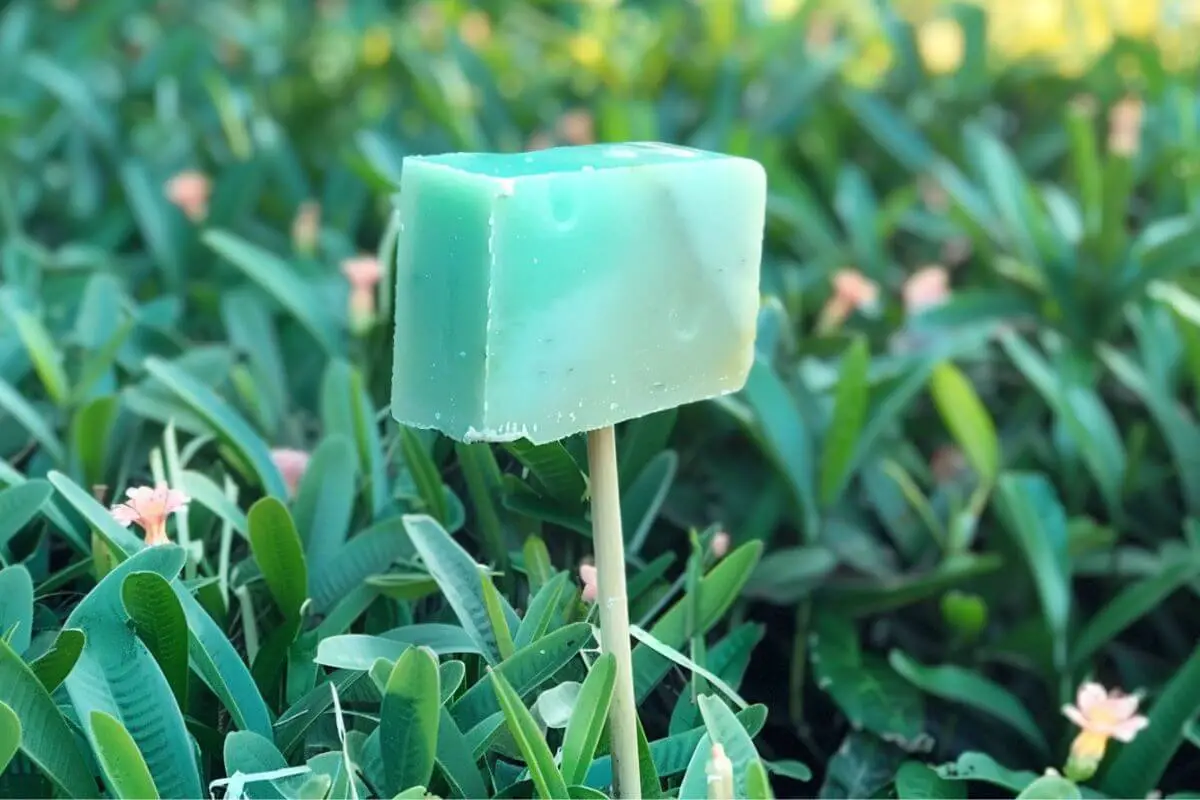
Bar soaps are another deterrent for animals. The strong smell of the soap can keep away animals like deer, rabbits, mice, and some insects.
Many gardeners have found success in deterring deer and groundhogs by using Irish Spring bar soap. Its strong scent is thought to repel these animals. Here are some methods they recommend:
- Grate the soap or cut it into cubes and scatter it around the garden.
- Hang the soap above the plants.
Soap works best for keeping animals out but may not work well if they are already in the garden. Use it with other things like fencing or motion-activated sprinklers for best results.
Animals may think twice about walking into your garden if you place a bar of soap near the edges of your garden.
8. Grow Herbs in the Garden
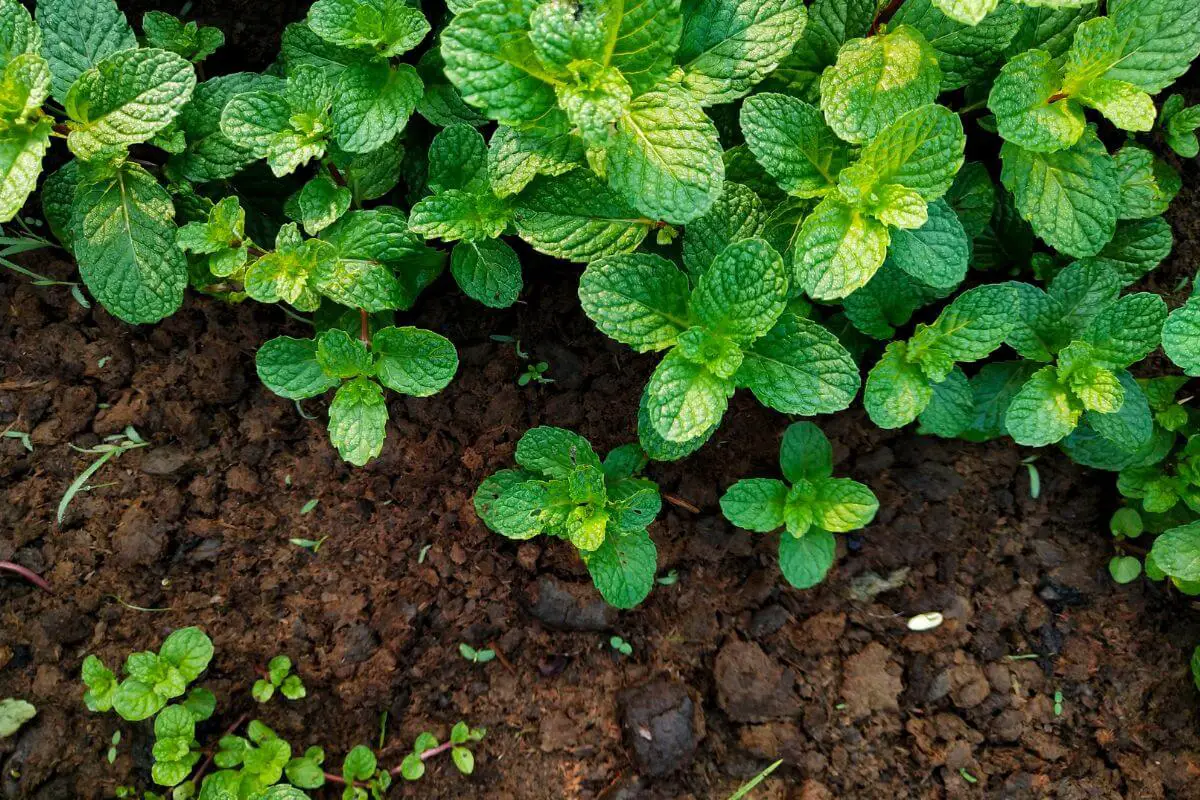
Herbs attract beneficial insects to your garden, but they also discourage herbivores like rabbits and deer. There are herbs that humans like that pests and animals don’t like them at all.
Here are some herbs that you can grow to keep pests away from your garden:
- Lavender – Deters mice, mosquitos, and other common pests.
- Rosemary – Keeps deer, mice, and rats away.
- Mint – Has a strong scent that can deter pests.
- Oregano – Plant around the garden to keep animals out.
- Garlic – Garlic helps keep moles, rabbits, and other pests away.
9. Cover Your Garden With Netting or Garden Fabric
Netting keeps bugs and small animals out of your garden, but it may not stop large animals like raccoons and deer because they’ll be able to move them more easily.
How to install Netting or Garden Fabric:
- Hang netting or fabric over garden hoops or frames.
- Secure edges with landscaping pins, clips, or weights.
- Leave slack for plant growth.
- Temporarily remove for garden access or harvesting.
Use garden fabric if it’s a smaller area or specific plants you want to protect.
Netting or bird netting can protect young plants from animals. It can be very helpful for stopping squirrels from digging up your garden beds.
It’s important to remember that what works can depend on your situation and how determined the animals are. You might need to try different ways and mix them to find what works best to keep animals out of your garden.
10. Plant Catnip
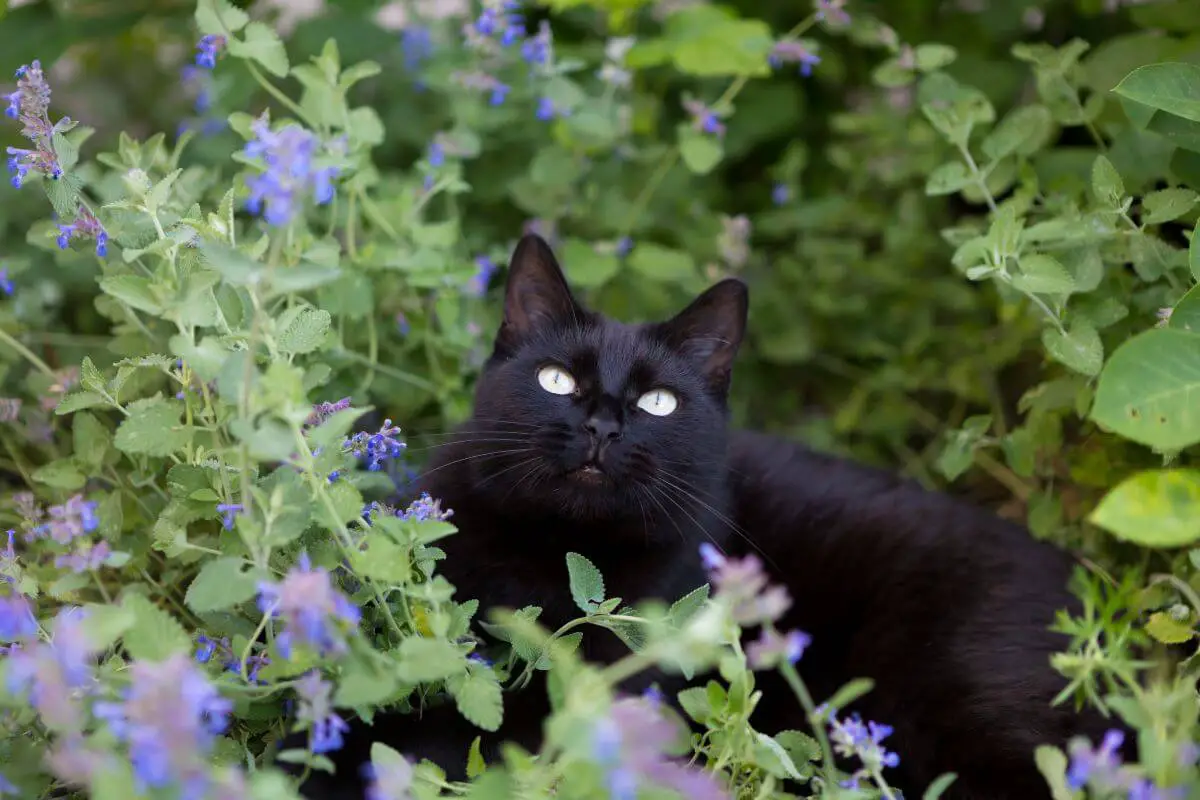
Catnip plants are easy to grow from seeds, which you can purchase online or at local nurseries. Since catnip is part of the mint family and can be invasive, it’s a good idea to plant it in containers or designated areas to control its spread.
You can use catnip to attract cats away from your garden by placing it in pots or bowls in other locations.
While catnip is known to repel certain insects like mosquitoes, its effectiveness varies. Some gardeners report success, but others haven’t seen a noticeable decrease in mosquito activity.
11. Place Prickly Mats Around the Garden
Prickly mats, featuring upward-facing spikes, can be placed around your garden to deter animals. When animals, particularly cats, step on these mats, the discomfort should discourage them from entering.
Consider various methods to protect your garden from cats:
- “Cat scat mats” are made of blunt plastic spikes, making it uncomfortable for cats to walk on them.
- Create dog hair smudge sticks by winding dog fur onto lavender twigs and placing them in the ground to deter cats.
- Laying down straw or rosebushes can also help prevent cats from using the garden as a litter box.
12. Scatter Coffee Grounds Around Plants
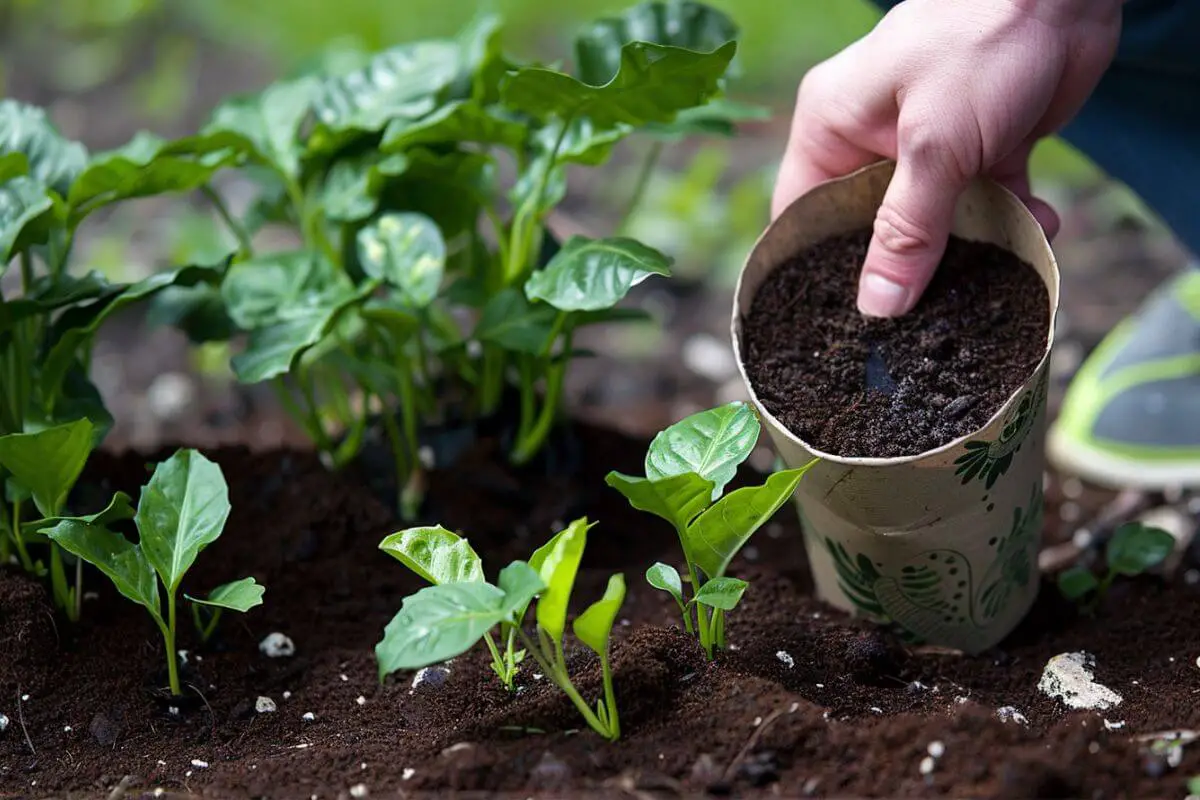
Some small animals and bugs will avoid gardens that use coffee grounds. The smell of coffee grounds repels them.
Place them around plants where you want to keep pests away. Used coffee grounds can be used to deter pests like slugs, cats, and ants.
Keep the following in mind when using coffee grounds in your garden:
- They can be added to compost or incorporated into the soil to improve its structure and drainage.
- While coffee grounds contain some nitrogen and micronutrients, they are not a primary source of plant nutrition.
- It’s advisable to use coffee grounds in moderation and balance their application with other nitrogen sources, like composted animal manure or grass clippings.
13. Use Wind Chimes
Wind chimes can deter animals due to the noise they produce, which animals typically avoid. They can be effective as long as you don’t have nearby neighbors who may be bothered by the sound.
Other options similar to wind chimes include:
- Creating loud noises such as banging pots and pans, playing loud music, or using wind chimes to startle rodents and keep them away from your property.
- Using high-pitched noises like ultrasonic pest repellers can also be effective in deterring rodents.
Other Experts Tips
Now that we’ve covered animals you don’t want in your garden, let’s discuss those that can actually benefit it.
Here are tips on how to attract the animals you want in your garden:
- Worms – Good for soil health. Attract them with compost and mulch.
- Butterflies – Important pollinators. Plant nectar-rich flowers and provide sunny spots.
- Birds – Some birds help with pest control. Use bird feeders and provide shelter.
- Lizards – Keep harmful insects away. Create a habitat with rocks and plants.
- Spiders – Control unwanted insects. Avoid pesticides and provide hiding places.
Keep Animals Out of the Garden Final Thoughts
Protecting your garden from animals involves various methods. You can use natural repellents like garlic and pepper or set up barriers such as fences and electric fences.
Certain plants like herbs can also repel animals. Understanding which animals are causing problems is important to finding the right solution.
Beneficial animals like worms and birds contribute positively to your garden’s ecosystem. Using different tricks and thinking about the good animals, you can have a happy garden with fewer animal problems.
Keep Animals Out of the Garden FAQs
1. How Do I Keep Animals Out of My Garden Without a Fence?
You can use various methods to deter animals from your garden even without a fence. Natural repellents like garlic, pepper, or vinegar can be sprayed around the garden perimeter.
You can also plant strong-smelling herbs like lavender or rosemary can also help keep animals away.
2. Will Vinegar Keep Animals Away From My Garden?
Vinegar can act as a repellent for some animals due to its strong odor. Mixing vinegar with water and spraying it around your garden can deter animals like deer, rabbits, or cats.
3. How Do I Know if Animals Are Causing Problems in My Garden?
Look for signs like tracks, nibbled plants, or holes in the ground. These can indicate the presence of animals like deer, rabbits, or squirrels.
4. Will Motion-Activated Devices Harm Animals?
No, motion-activated devices are designed to scare animals away without causing them harm. They usually emit sounds or spray water to deter animals from entering your garden.
Here are some other articles that you might be interested in:











Thanks Denise; helpful though I’m really trying to avoid my son’s dog jumping on the garden!